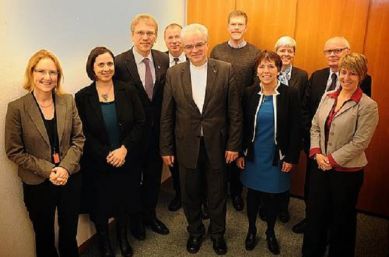Ecumenicals Plan for Reformation's 500th Anniversary, Homily Reflects on Celebration's 'Word' Motto

Ecumenical organizations came together in Geneva this week to plan for the celebration in 2017 of the 500th anniversary of the seminal moment in the Reformation when Martin Luther posted his 95 Theses in Wittenberg.
Representatives of the World Council of Churches, Lutheran World Federation, the World Conference of Reformed Churches and the Evangelical Church in Germany (EKD) participated in planning on Wednesday at the Ecumenical Centre.
The day began with a homily during morning prayers by Bishop Martin Schindehütteof the EKD.
He reflected on the motto adopted by the state and church for their joint processes of planning and implementation to celebrate the anniversary - "In the beginning was the Word," taken the first verse of the Gospel of John.
He said that the state's observance would focus on the Reformation's boost to freedom of conscience and democratic impulses. He added that "[a]s church, we associate all these things with the motto, too."
"Hopefully, first and foremost, we associate it with the Word which comes to us from God," hesaid. "We associate it with the testimonies of Scripture, which inform us and give us an understanding of testimonies of faith and experiences of God, and which lead us to faith."
He said the phrase "In the beginning" does not identify a certain time span, "but an ultimate ground, an ultimate source, an antecedent being, on which everything is founded and rests."
He also said the word "Word" had a "profoundly different meaning than merely being a symbol in the process of conveying information and communication."
"The Word does not indicate a reality. It creates reality. It is reality. It becomes reality," he said.
"The Word is in the beginning, before creation, with God and is the creative medium for all creation. It becomes human existence, it becomes "flesh": Jesus, his life and work, his preaching, his suffering, death and resurrection. This is the one Word God has to say to the world. SolusChristus! Creatioverbidivini! Before the beginning of time, God knew, God thought of it. And he shares this Word with his world, by allowing himself to be involved in this world. Et incarnatus est!"
He neared the end of his brief homily by reading again from the Gospel of John.
"In the beginning was the Word, and the Word was with God, and the Word was God ... The Word became flesh and made his dwelling among us." (NIV).
"These sentences contain the mystery of God," he said. "For the rediscovery of this mystery in the gospel we have to search, to strive and to pray time and time again. This is the basic impetus of the Reformation: We can only ever draw close and close. However, we may seek refuge in this mystery in prayer."